Greece Is More Popular Than Ever—But It Can Still Surprise You
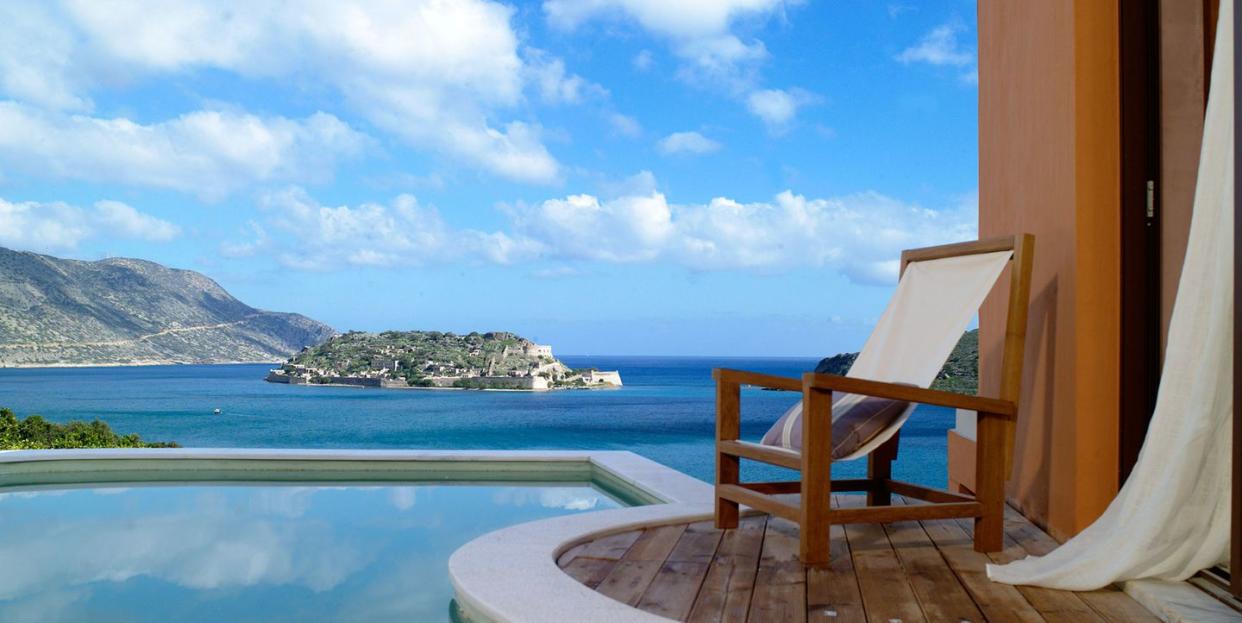
It’s a Saturday night in Athens in late August, near the end of high season, and the vacation crowds are beginning to taper off. Many Athenians have escaped to nearby beaches, squeezing in a last bit of summer. There’s still a pulse to the city, but it takes a while to wake to the night. Later, there will be drinks, and 2:00 a.m. souvlaki. For now, still early in the evening, our group of seven is arguing fervently—and at length—about the meaning of life.
Where else would such a scene take place but at a bar called Plato? In the city that invented democracy, it may seem predictable to name a bar after the great philosopher, who founded the first institution of higher learning in the western world. But the Academia of Athens—a boutique hotel within Marriot’s Autograph Collection, which had invited Town & Country to Greece to visit several of its properties—is after something quite different than a perfunctory nod to ancient history.
Each week, a visiting professor holds court, and anyone who stops in for a drink is invited to engage in conversation. When ours announced the night’s topic would be “love and happiness,” more than a few eyebrows were raised. Would this be silly, a therapy session shoehorned inside the history of philosophy? Maybe. But sometimes a traveler needs to be earnest, to be a little embarrassed with enthusiasm.
It didn’t take long for us to get into it. He posed questions, we tried to answer. “Can you be truly happy being alone?” “Is happiness about meaning in your own work, or providing meaning to others?“ There was no consensus. Only more talk, more wine. One thing leads to the other.
The Academia is a hotel that wants to shake you awake, to sharpen your senses. In the lobby, you are greeted, or maybe confronted, by a quote from Socrates carved into the marble wall: I am not Athenian or Greek, but a citizen of the world. At check in, you are handed an Elixir of Life, a non-alcoholic welcome drink of lemon, soda, cinnamon, and honey, to help with jet lag. The hotel’s restaurant, Symposium, run by Michelin-starred restaurateur Apostolos Trastellis, is equally stimulating. Smoked eel and fava melt on the tongue; the flaky, familiar crunch of spanakopita is somehow rendered new.
Rooms are sleek and modern, designed to be a respite from the busy world outside. And oh, will you be outside. The Academia is within walking distance to Athens’ highlights—you are steps from the boutiques in Kolonaki square; the Museum of Cycladic Art; the thriving scene at cocktail bars like the Clumsies; the Plaka and the Monastiraki neighborhood, with the ruins of Hadrian’s Library and the ancient agora. And of course, the main event: the Acropolis. The Academia’s rooftop bar, Aether, has a stunning view of the nation’s most famous landmark.
Standing at the Acropolis in the growing heat of the day, trying to figure out how they built all that, in just nine years, and listening to the mathematics of optical illusions, and straight lines, and pulleys and levers, you almost don’t even need to know how they did it. You just need to stand there and let yourself be impressed.
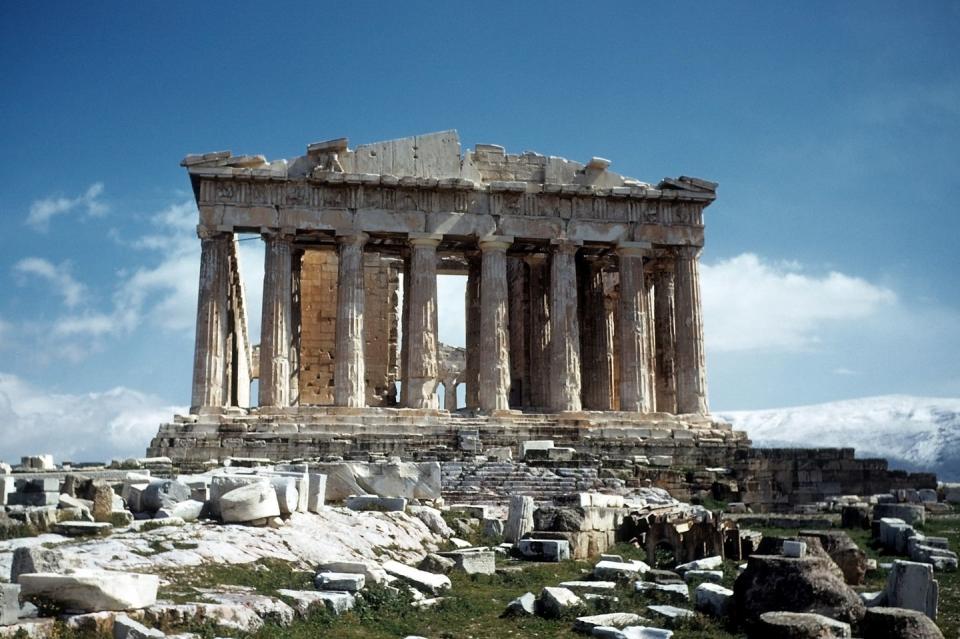
Taking in the columns above, the sweep of the city below, the sea beyond, I thought of something the professor told us the night before. The Ancient Greeks believed that to be happy meant to flourish, to become the perfect version of yourself. To do so requires work, and you can never actually achieve it. But there is beauty in the attempt.
The Greeks invented blue. Or at least, it feels that way when you’re looking out into the prismatic Aegean, watching ripples of sky, aqua, and cobalt merge into something new altogether. At the Domes of Elounda—an Autograph Collection resort on the northeastern coast of the island of Crete—you quickly forget there is a real world to return to, a world without lounge chairs at the water’s edge, tucked under the shade of olive trees. Many resorts promise a sense of true escape, a paradise of unparalleled views and services. The Domes delivers in spades.
There’s that impossibly blue ocean, for one thing. There’s the fact that, although you’re only a forty-minute flight from Athens and then an hour’s drive from the Heraklion airport, you feel worlds away. The town of Elounda is discreet, small, and removed from the fray—such are its charms that the Saudi royal family frequently vacations there.
The Domes, perched on the cliffs above the Aegean, has 78 suites and 40 villas. You should, without question, book a villa. Each one has spacious patios, cabanas, a private plunge pool, and a 24/7 on-call manager, plus dedicated lounge chairs at the private beach. When you’re not at the pool or the beach, spend a day at the spa (simply moving from the laconium, to the steam room, to the frigidarium, to the sauna, and ending in a heated lounge chair is a blissful way to spend an hour.) The resort has four restaurants, but if you feel restless, you can drive ten minutes to a truly tiny village called Plaka, for fish at Taverna Giorgios Giovanni. The owner has a boat and a diver who goes into the sea, each day, to fetch him an octopus.
On our first night in Elounda, we took a sunset sail. Near a rocky outcropping, miles from anywhere, we dropped anchor. Climbing onto the bow, we plunged into the water, whooping and laughing like children. I dipped my head back and let that salty sea hold me up. In the stillness of that moment came the feeling of being the only people on earth, that this scene unfolded just for us.
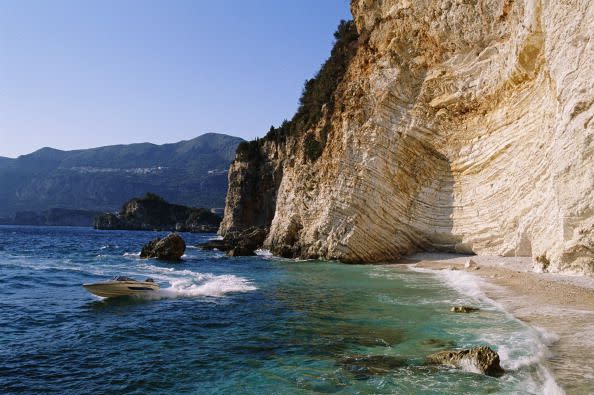
The morning of our last day in Crete, we visited Spinalonga, a small spit of land that looms close to Elounda, a mere five-minute speedboat ride away. The island forms a barrier to Elounda’s harbor, and served as a military fortress during Venetian, and later Ottoman, rule. It is more notoriously known for being the last leper colony in Europe, from 1903 until 1957. In 1913, when Crete became part of Greece, all lepers in Greece were sent there. To pass through Dante’s Gate, as the arched entrance is called, was a death sentence: there was no cure for leprosy, and once afflicted, one could never return to society.
Spinalonga is in the final stages of becoming a UNESCO World Heritage site, and some 400,000 people visit it each year. It was 10 in the morning, and already large boats were arriving to dislodge scores of tourists, who descended upon the island with cameras and good walking shoes. Our guide took us on a one-hour walk through the ruins.
We saw the room where clothes and money were disinfected (the lepers received a small stipend from the Greek government to buy goods from sellers who came over from the mainland). Imprints of normal human life remained—a church where weddings were held; old storefronts; a former café.
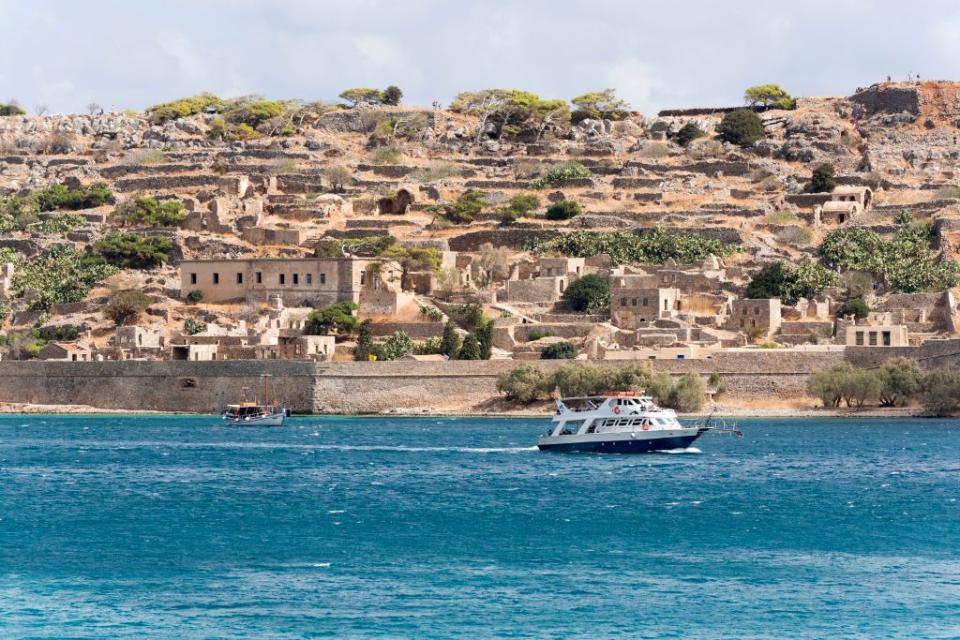
Still, conditions on the island were grim: there was no running water, plumbing, or electricity until the 1930s. There was a hospital, but medical care was rudimentary. Children born to those in the colony were taken away. At the other end of the island was a cemetery, close to a second church, for funerals. The greatest anguish of all may have been the proximity to the mainland, to loved ones who could never visit— the closeness to one’s former life.
We squinted into horizon across the dazzling Gulf of Elounda. Someone in our party said, quietly, “I’m going to have a grateful day.” I thought back to the dialogue at the Academia Hotel. The ancient Greeks believed that happiness must be ethical, the professor told us. You can only flourish if others do.
We left Spinalonga the way we came: swiftly, knowing we would return safely back to shore. Others of course, never got the chance.
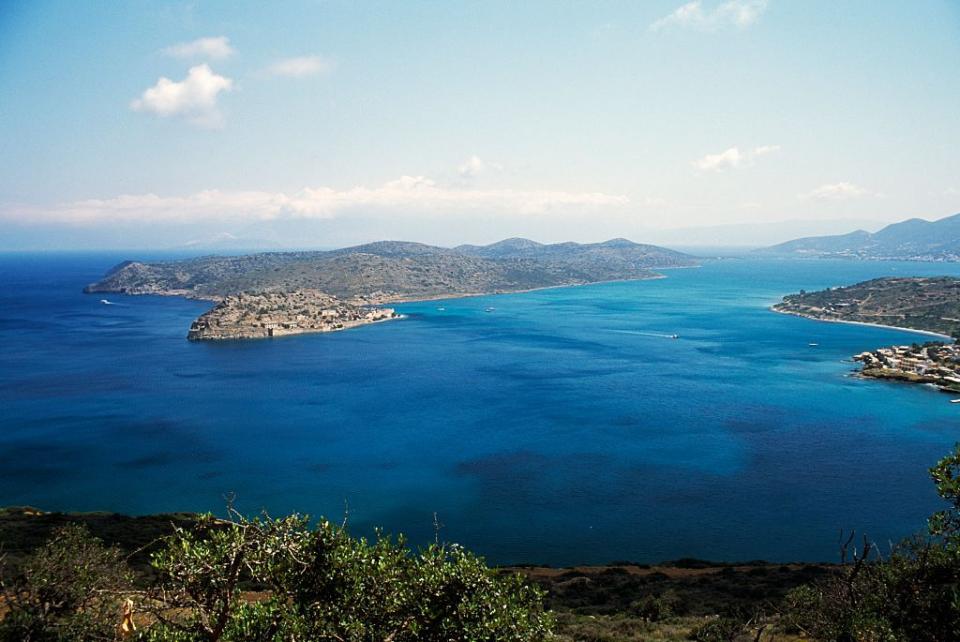
I knew Greece would be beautiful. I didn’t know it would make me think and feel, more deeply than I had in a while, and want to share it with anyone who would lend a willing ear. This is the kind of trip that, in revealing both the highlights and the shadows of a place, makes you examine your life on this earth, and your good fortune. Weeks later, I am still finding new answers to old questions.
Aristotle said that happiness is unique to humans. Yes, animals feel pleasure, but humans can achieve something greater: we can internalize moments of pleasure and pain, learn from them, grow. This is why we travel. To feel pleasure, yes, but something else. To flourish, to attempt that perfect version of ourselves, knowing all the while we never will be.
You Might Also Like

